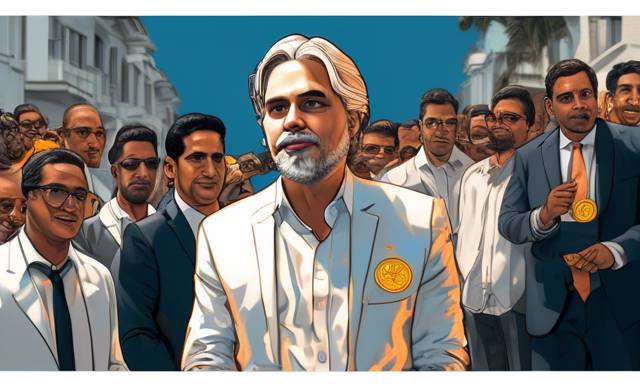Summary of El Salvador’s Bitcoin Journey 🌍
In recent times, El Salvador has taken significant strides in the realm of cryptocurrency, particularly by becoming the first nation to accept Bitcoin as a legal payment method. Despite its trailblazing efforts, the initiative has faced scrutiny and criticism from international financial entities like the International Monetary Fund (IMF), which has repeatedly urged reforms. As discussions continue, the country stands firm in its belief in the potential of Bitcoin, but not without facing hurdles and challenges. The ongoing dialogue reflects a shift in perspectives, hinting at a future that may still hold promise for digital currencies in the nation.
El Salvador’s Bitcoin Experiment: A Double-Edged Sword ⚖️
El Salvador stands out as a frontrunner in cryptocurrency adoption, having formally recognized Bitcoin as legal tender starting in September 2021. While the government has embraced this innovative approach, it has not garnered unanimous support globally. Prominent institutions, particularly the IMF, have voiced concerns regarding the implications of such a bold move.
As of now, the nation maintains a Bitcoin reserve comprising 5,892 coins, valued at approximately $348 million. This impressive quantity includes at least 474 coins mined in 2024, utilizing renewable energy from a geothermal plant powered by volcanic activity at Tecapa.
The current market reflects Bitcoin’s price hovering around $61,280, demonstrating a slight increase of 1% during the day. Over the last week, the cryptocurrency experienced a loss of 6.52%, but it is still up by 8.42% over the past month.
Local Sentiment Towards Bitcoin Adoption 📊
The reception of President Bukele’s policies regarding Bitcoin has been mixed. Research conducted by the University of Central America in 2021 indicated that around 77% of Salvadorans regarded the nation’s Bitcoin venture as a failure. This sentiment encapsulates the challenges associated with economic transformation through digital currencies.
Despite persistent criticism, which advocates for caution and measured adoption, the IMF has sustained an open dialogue with the Salvadoran administration. In 2022, the IMF extended technical assistance, focusing on usage statistics amidst the complexities of cryptocurrency engagement.
Notably, the IMF acknowledged that potential risks linked to the country’s cryptocurrency integration have not yet manifested, a position shared in a blog post published earlier this yearwhen the price of Bitcoin was significantly lower at around $21,820.
Revisiting the Discussion on Bitcoin Regulation 🛡️
In a recent press briefing, IMF spokesperson Julie Kozack expressed recommendations to refine the current laws governing Bitcoin in El Salvador. This includes enhancing regulatory frameworks while simultaneously minimizing public sector risk exposure to the digital asset.
On a more optimistic front, Kozack highlighted the strides taken in the proposed budget for 2025, although she underscored the importance of effective implementation. In an August interview with TIME magazine, President Bukele recognized the benefits of Bitcoin yet admitted that the widespread adoption he anticipated has yet to fully materialize.
While discussions might appear stagnant, signs suggest that both parties have shown a willingness to adapt. The IMF’s previous calls for El Salvador to abandon Bitcoin as legal tender have transitioned to a request for moderated policy revisions, indicating a potential pathway toward resolution.
Looking Ahead: The Future of Bitcoin in El Salvador 🔮
Even passionate advocates for cryptocurrency acknowledge the multifaceted challenges unique to broad adoption. The ongoing discussions between the IMF and the Salvadoran government are unlikely to usher in profound and immediate transformations. However, the noticeable signs of a tentative compromise provide a glimmer of hope for the integration of Bitcoin into the nation’s financial ecosystem.
Expanding the use of digital currencies brings along several complexities, one of which was demonstrated by a cybersecurity breach in April that compromised the source code for El Salvador’s digital wallet, Chivo. Such incidents underscore the challenges that can arise when introducing new technologies into the established financial framework.
It’s crucial to remember that a single nation’s decision to use Bitcoin as legal tender may not reflect the broader trends of cryptocurrency adoption globally. Each country’s approach will vary significantly based on their unique economic conditions and regulatory landscapes.
Hot Take on El Salvador’s Cryptocurrency Future 💬
El Salvador’s journey with Bitcoin brings forth both significant opportunities and notable obstacles. As the nation navigates this evolving landscape, it’s essential to closely observe how regulatory dialogue and market dynamics shape the future. Progress might not come overnight, but continued engagement between stakeholders can pave the way for gradual transformation and potentially meaningful advancements in the realm of cryptocurrencies.





 By
By
 By
By

 By
By
